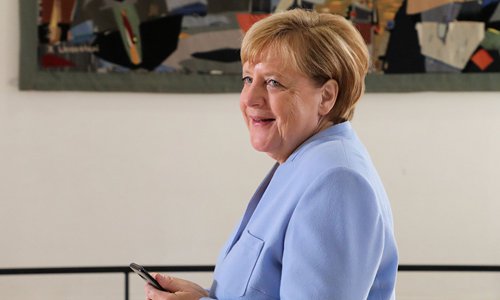HOME >> BUSINESS
Merkel’s visit to boost bilateral cooperation
Source:Global Times Published: 2019/9/5 22:48:41
BRI projects can benefit from introduction of German technology

German Chancellor Angela Merkel Photo:VCG
German Chancellor Angela Merkel's visit to China is expected to boost bilateral cooperation, especially in terms of the Belt and Road Initiative (BRI), experts said on Thursday.
In a phone call on Wednesday evening with Chinese Premier Li Keqiang, Merkel expressed anticipation of deepening the bilateral cooperation with China in the complex international environment. Li said China would like to work with Germany to sustain multilateralism and free trade.
Merkel is visiting China this week, the 12th since she became Germany's chancellor, according to media reports.
"China's and Germany's contributions to the BRI have achieved great results," Gao Feng, spokesperson of the Ministry of Commerce (MOFCOM), said on Thursday. "Companies such as Siemens and Voith have cooperated closely with China in third markets."
Siemens, for example, has been cooperating with Chinese companies on the BRI since 2018. It has already built collaboration relationships with companies including CGGC International in projects in markets like Indonesia and the Philippines.
These cooperation projects are not that unusual. Instead, they are but a small portion of the cooperation between China and Germany under the BRI, Zhang Jianping, director general with the Center for Regional Economic Cooperation under the MOFCOM, told the Global Times on Thursday.
"Germany is very enthusiastic about the BRI," Zhang said. "In Cambodia, for example, the Heinrich Böll Foundation, supported by The Greens party from Germany, is working closely with Chinese experts in local communities, improving the environment and local livelihoods."
"In Africa, organizational groups from Germany are also collaborating with Chinese experts," Zhang said.
"Trade and economic cooperation between China and Germany is being very closely watched," Li Lezeng, a professor at Shanghai's Tongji University, told the Global Times, especially given the current situation in world trade and economy. Cooperation between the two countries can bring about much more.
According to media reports, Merkel's itinerary includes Beijing and Wuhan in Central China's Hubei Province. Some German companies will also visit Chinese companies and universities to seek cooperation opportunities in emerging areas such as self-driving, advanced manufacturing and artificial intelligence.
The exchange of technologies between China and Germany will also upgrade the projects under the BRI and further strengthen the relationship between the two countries, Zhang said.
Cooperation between China and Germany has been strengthening in recent years. According to Gao, from January to July this year, bilateral trade reached $107 billion, increasing 2.4 percent year-on-year.
German companies are also showing great interest in the second China International Import Expo. According to Gao, more than 200 German companies have signed up for the expo, making Germany the country with the largest exhibition area as well as the one with the largest number of companies among all European countries.
"Germany can bring a lot of advanced technologies and management skills to the joint projects with China. It will also encourage local innovation in third countries and make BRI projects more sustainable," Zhang said.
Posted in: ECONOMY